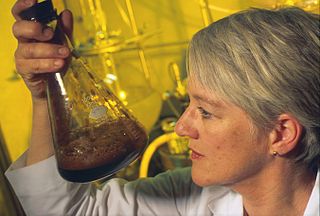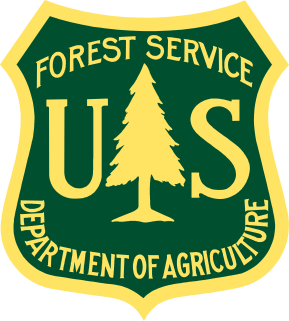Bioproducts engineering or bioprocess engineering refers to engineering of bio-products from renewable bioresources. This pertains to the design and development of processes and technologies for the sustainable manufacture of bioproducts (materials, chemicals and energy) from renewable biological resources.
Bioproducts engineers harness the molecular building blocks of renewable resources to design, develop and manufacture environmentally friendly industrial and consumer products. From biofuels, renewable energy, and bioplastics to paper products and "green" building materials such as bio-based composites, Bioproducts engineers are developing sustainable solutions to meet the world's growing materials and energy demand. Conventional bioproducts and emerging bioproducts are two broad categories used to categorize bioproducts. Examples of conventional bio-based products include building materials, pulp and paper, and forest products. Examples of emerging bioproducts or biobased products include biofuels, bioenergy, starch-based and cellulose-based ethanol, bio-based adhesives, biochemicals, biodegradable plastics, etc. [1] [2] Bioproducts Engineers play a major role in the design and development of "green" products including biofuels, bioenergy, biodegradable plastics, biocomposites, building materials, paper and chemicals. Bioproducts engineers also develop energy efficient, environmentally friendly manufacturing processes for these products as well as effective end-use applications. Bioproducts engineers play a critical role in a sustainable 21st century bio-economy by using renewable resources to design, develop, and manufacture the products we use every day. The career outlook for bioproducts engineers is very bright with employment opportunities in a broad range of industries, including pulp and paper, alternative energy, renewable plastics, and other fiber, forest products, building materials and chemical-based industries.
Commonly referred to as bioprocess engineering, bioprocess engineering is a specialization of biotechnology, biological engineering, chemical engineering or of agricultural engineering. It deals with the design and development of equipment and processes for the manufacturing of products such as food, feed, pharmaceuticals, nutraceuticals, chemicals, and polymers and paper from biological materials. Bioprocees engineering is a conglomerate of mathematics, biology and industrial design, and consists of various spectrums like designing of fermentors, study of fermentors (mode of operations etc.). It also deals with studying various biotechnological processes used in industries for large scale production of biological product for optimization of yield in the end product and the quality of end product. Bio process engineering may include the work of mechanical, electrical and industrial engineers to apply principles of their disciplines to processes based on using living cells or sub component of such cells. [3]

Paper engineering is a branch of engineering that deals with the usage of physical science and life sciences in conjunction with mathematics as applied to the converting of raw materials into useful paper products and co-products. The field applies various principles in process engineering and unit operations to the manufacture of paper, chemicals, energy and related materials. The following timeline shows some of the key steps in the development of the science of chemical and bioprocess engineering:

UPM-Kymmene Oyj is a Finnish forest industry company. UPM-Kymmene was formed by the merger of Kymmene Corporation with Repola Oy and its subsidiary United Paper Mills Ltd in 1996. UPM consists of six business areas: UPM Fibres, UPM Energy, UPM Raflatac, UPM Specialty Papers, UPM Communication Papers and UPM Plywood. The Group employs around 17,000 people and it has production plants in 12 countries. UPM shares are listed on the NASDAQ OMX Helsinki stock exchange. UPM is the only paper company which is listed in the global Dow Jones Sustainability Index and the only forest industry company invited to the United Nations Global Compact LEAD sustainability leadership platform.
Cellulosic ethanol is ethanol produced from cellulose rather than from the plant's seeds or fruit. It can be produced from grasses, wood, algae, or other plants. It is generally discussed for use as a biofuel. The carbon dioxide that plants absorb as they grow offsets some of the carbon dioxide emitted when ethanol made from them is burned, so cellulosic ethanol fuel has the potential to have a lower carbon footprint than fossil fuels.

A biorefinery is a refinery that converts biomass to energy and other beneficial byproducts. The International Energy Agency Bioenergy Task 42 defined biorefining as "the sustainable processing of biomass into a spectrum of bio-based products and bioenergy ". As refineries, biorefineries can provide multiple chemicals by fractioning an initial raw material (biomass) into multiple intermediates that can be further converted into value-added products. Each refining phase is also referred to as a "cascading phase". The use of biomass as feedstock can provide a benefit by reducing the impacts on the environment, as lower pollutants emissions and reduction in the emissions of hazard products. In addition, biorefineries are intended to achieve the following goals:

Biomass to liquid is a multi-step process of producing synthetic hydrocarbon fuels made from biomass via a thermochemical route.

In industrial chemistry, black liquor is the by-product from the kraft process when digesting pulpwood into paper pulp removing lignin, hemicelluloses and other extractives from the wood to free the cellulose fibers.

The Forest Products Laboratory (FPL) is the national research laboratory of the United States Forest Service, which is part of USDA. Since its opening in 1910, the FPL has provided scientific research on wood, wood products and their commercial uses in partnership with academia, industry, tribal, state, local and other government agencies. The laboratory is headquartered in Madison, Wisconsin. The focus of the Forest Products Laboratory is to promote healthy forests and forest-based economies through the efficient, sustainable use of the Nation's wood resources.
Pyrolysis oil, sometimes also known as bio-crude or bio-oil, is a synthetic fuel under investigation as substitute for petroleum. It is obtained by heating dried biomass without oxygen in a reactor at a temperature of about 500 °C (900 °F) with subsequent cooling. Pyrolysis oil is a kind of tar and normally contains levels of oxygen too high to be considered a pure hydrocarbon. This high oxygen content results in non-volatility, corrosiveness, immiscibility with fossil fuels, thermal instability, and a tendency to polymerize when exposed to air. As such, it is distinctly different from petroleum products. Removing oxygen from bio-oil or nitrogen from algal bio-oil is known as upgrading.

Biomass is plant-based material used as fuel to produce heat or electricity. Examples are wood and wood residues, energy crops, agricultural residues, and waste from industry, farms and households. Since biomass can be used as a fuel directly, some people use the words biomass and biofuel interchangeably. Others subsume one term under the other. Government authorities in the US and the EU define biofuel as a liquid or gaseous fuel, used for transportation. The European Union's Joint Research Centre use the concept solid biofuel and define it as raw or processed organic matter of biological origin used for energy, for instance firewood, wood chips and wood pellets.
Bioprocess engineering, also biochemical engineering, is a specialization of chemical engineering or biological engineering. It deals with the design and development of equipment and processes for the manufacturing of products such as agriculture, food, feed, pharmaceuticals, nutraceuticals, chemicals, and polymers and paper from biological materials & treatment of waste water. Bioprocess engineering is a conglomerate of mathematics, biology and industrial design, and consists of various spectrums like designing of bioreactors, study of fermentors. It also deals with studying various biotechnological processes used in industries for large scale production of biological product for optimization of yield in the end product and the quality of end product. Bioprocess engineering may include the work of mechanical, electrical, and industrial engineers to apply principles of their disciplines to processes based on using living cells or sub component of such cells.

Abengoa, S.A. was a Spanish multinational company in the green infrastructure, energy and water sectors. The company was founded in 1941 by Javier Benjumea Puigcerver and José Manuel Abaurre Fernández-Pasalagua, and was based in Seville, Spain. Its current chairman is Gonzalo Urquijo Fernández de Araoz. After repeated bankruptcies and rescues, it declared insolvency in February 2021 amid various regulatory and financial charges against the board and management, the second-largest corporate collapse in Spanish history.

Biobased economy, bioeconomy or biotechonomy is economic activity involving the use of biotechnology and biomass in the production of goods, services, or energy. The terms are widely used by regional development agencies, national and international organizations, and biotechnology companies. They are closely linked to the evolution of the biotechnology industry and the capacity to study, understand, and manipulate genetic material that has been possible due to scientific research and technological development. This includes the application of scientific and technological developments to agriculture, health, chemical, and energy industries.

Acetone–butanol–ethanol (ABE) fermentation, also known as the Weizmann process, is a process that uses bacterial fermentation to produce acetone, n-butanol, and ethanol from carbohydrates such as starch and glucose. It was developed by chemist Chaim Weizmann and was the primary process used to produce acetone, which was needed to make cordite, a substance essential for the British war industry during World War I.
The Joint BioEnergy Institute (JBEI) is a research institute funded by the United States Department of Energy. JBEI is led by the Lawrence Berkeley National Laboratory, and includes participation from the Sandia National Laboratory, Lawrence Livermore National Laboratory, as well as UC Berkeley, UC Davis, Iowa State University, and the Carnegie Institute. JBEI is located in Emeryville, California.

Cellana, Inc. is an American company which develops of algae-based bioproducts for high-value nutrition, ink, and bioenergy applications, including Omega-3 nutraceutical applications, sustainable ink, aquaculture and animal feeds, human food ingredients, pigments, specialty chemicals, and biofuels. The company, with offices in Hawaii and San Diego, has received multiple multimillion-dollar grants from the United States Department of Energy and United States Department of Agriculture.
Bioproducts or bio-based products are materials, chemicals and energy derived from renewable biological resources.
Bioresource engineering is similar to biological engineering, except that it is based on biological and/or agricultural feedstocks. Bioresource engineering is more general and encompasses a wider range of technologies and various elements such as biomass, biological waste treatment, bioenergy, biotransformations, bioresource systems analysis, bioremediation and technologies associated with Thermochemical conversion technologies such as combustion, pyrolysis, gasification, catalysis, etc.
Biorefining is the process of "building" multiple products from biomass as a feedstock or raw material much like a petroleum refinery that is currently in use. A biorefinery is a facility like a petroleum refinery that comprises the various process steps or unit operations and related equipment to produce various bioproducts including fuels, power, materials and chemicals from biomass. Industrial biorefineries have been identified as the most promising route to the creation of a new domestic biobased industry producing entire spectrum of bioproducts or bio-based products.
Cellulosic sugars are derived from non-food biomass (e.g. wood, agricultural residues, municipal solid waste). The biomass is primarily composed of carbohydrate polymers cellulose, hemicellulose, and an aromatic polymer (lignin). The hemicellulose is a polymer of mainly five-carbon sugars C5H10O5 (xylose). and the cellulose is a polymer of six-carbon sugar C6H12O6 (glucose). Cellulose fibers are considered to be a plant’s structural building blocks and are tightly bound to lignin, but the biomass can be deconstructed using Acid hydrolysis, enzymatic hydrolysis, organosolv dissolution, autohydrolysis or supercritical hydrolysis.

Amar K. Mohanty is a material scientist and biobased material engineer, academic and author. He is a Professor and Distinguished Research Chair in Sustainable Biomaterials at the Ontario Agriculture College and is the Director of the Bioproducts Discovery and Development Centre at the University of Guelph.